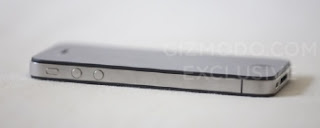 Gizmodo says that the person woke up to find the phone dead--thanks to Apple's MobileMe service, which allows users to wipe their stolen iPhones of all data, remotely. The person then noticed the phone looked different from other iPhones--for one thing, it had a front-facing camera--and managed to remove the "disguise" case. Upon discovering that this iPhone was not like any other iPhone out there, this person promptly forgot their promise to find Gray Powell and return the phone, and started selling to the highest bidder. Did Gizmodo shell out $5,000 for its exclusive lost iPhone 4G story? Yes, says head of Gawker Media (the publisher of Gizmodo) Nick Denton, who tweeted earlier Monday, "Yes, we're proud practitioners of checkbook journalism. Anything for the story!" and "Does Gizmodo pay for exclusives? Too right!" (image credit: www.pcworld.com).
Gizmodo says that the person woke up to find the phone dead--thanks to Apple's MobileMe service, which allows users to wipe their stolen iPhones of all data, remotely. The person then noticed the phone looked different from other iPhones--for one thing, it had a front-facing camera--and managed to remove the "disguise" case. Upon discovering that this iPhone was not like any other iPhone out there, this person promptly forgot their promise to find Gray Powell and return the phone, and started selling to the highest bidder. Did Gizmodo shell out $5,000 for its exclusive lost iPhone 4G story? Yes, says head of Gawker Media (the publisher of Gizmodo) Nick Denton, who tweeted earlier Monday, "Yes, we're proud practitioners of checkbook journalism. Anything for the story!" and "Does Gizmodo pay for exclusives? Too right!" (image credit: www.pcworld.com).According to AOL's Daily Finance, Engadget had the chance to bid after it published the first fuzzy photos of the phone, but declined. Engadget editor in chief Joshua Topolsky says he doesn't believe in checkbook journalism as "it encourages awful behavior in tipsters." This is not the first time Gawker Media has paid for a story, either--in October 2009, Gawker reportedly paid a 25-year-old researcher for the confirmation that the (by then, infamous) "Balloon Boy" story was a hoax. Also, in January 2010, Gawker's tech blog Valleywag offered up to $100,000 for concrete details on the (then rumored) Apple tablet: $10k for pictures, $20k for video, $50k for pictures or video of Steve Jobs holding one, and $100k if you could put it in Valleywag's hands for an hour.
Apple wasn't too pleased with Valleywag's "Scavenger Hunt," however, and immediately sent Valleywag's editor in chief a letter saying that Valleywag had "crossed the line" by offering "a bounty for the theft of Apple's trade secrets," and demanded that Valleywag immediately discontinue the hunt. Which is why, of course, it's curious that Apple hasn't spoken up with regards to this latest "leak," if it is, in fact, that. The Daily Finance also suggests that Engadget may have been worried about the potential repercussions of buying a supposedly "lost and found" item. After all, California Penal Code Section 485 states : "One who finds lost property under circumstances which give him knowledge of or means of inquiry as to the true owner, and who appropriates such property to his own use, or to the use of another person not entitled thereto, without first making reasonable and just efforts to find the owner and to restore the property to him, is guilty of theft."
Since the person who found this prototype did see Gray Powell's Facebook page on the iPhone, and did plan on returning it to Powell (before, you know, Gizmodo accidentally dropped $5k their way), one could argue that, in accordance with Section 485, the phone was stolen. Perhaps that's why our anonymous tipster wanted to stay anonymous. As for Gizmodo? When Computerworld asked Denton if he and Gizmodo were worried about the potential ramifications of publishing what could be considered Apple trade secrets, Denton simply cited a January 2008 lawsuit by the Church of Scientology (when Gawker posted clips of a "private religious event") and said, "Formidable though Steve Jobs may be, the Church of Scientology has a more vicious reputation for litigation."
Source : http://www.pcworld.com/